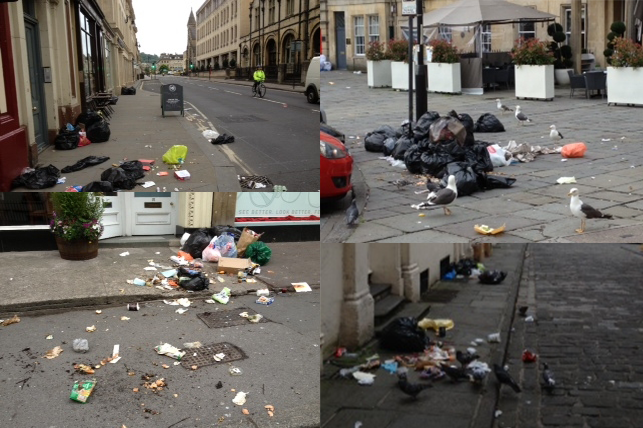The Council has been accused of ‘failing badly’ in its attempts to tackle Bath’s litter and gull problems, after they reaffirmed the measures they are taking with a reminder that it is local people who can do most to stop the menace caused by these birds.

This is a familiar sight across the city centre on a regular basis.
Conservative councillors have said the Liberal Democrat-run Council is not taking enough action to prevent litter being strewn across streets in the city centre.
Conservatives have called on the Council to take a tougher stance against businesses who leave their commercial waste on city centre streets for long periods of time and encourage them to use gull-proof containers rather than thin plastic sacks.
Councillor David Dixon (Lib-Dem, Twerton), Cabinet Member for Neighbourhoods, said, “The Council is battling against the forces of nature as we combat the problem of urban gulls. But residents and visitors to the city must also be proactive in doing their best to stop their supply of food.
“Our message is very clear. Don’t feed or encourage gulls by dropping food or feeding them scraps. Dispose of your litter responsibly in litter bins or take the litter home with you. And use the food waste collection service where it is provided by the Council as part of your weekly waste collection. Those people who don’t receive this but have a Council provided gull proof sack should use that.
“Businesses must also play their part by putting their waste out at the correct time which will help. Our enforcement action against repeat offenders is starting to get the message across that anyone who puts out waste overnight is part of the problem.”
Conservative shadow spokesman for Neighbourhoods, Cllr Geoff Ward, has warned that the increasing problems with litter and food waste on Bath’s streets could cause a public health hazard and is urging the Council to take immediate action.
The warnings also come on top of recent criticism of the Council for reducing the number of litter bins in the city centre.
Cllr Geoff Ward, who is an Environment Health practitioner by profession, (Cons, Bathavon North) said: “B&NES must be living in a parallel universal if it thinks Bath’s gull and litter problem is getting better. The action the Council says its taking is clearly failing badly. You only have to walk around the centre, especially in the early mornings or evenings, to see the terrible state of some of the streets, with food waste and litter strewn everywhere. There is a real risk this could become a public health hazard if more isn’t done.
“The Council is allowing businesses to pile up their waste bags on the street, which gulls immediately begin to peck at and break open. The Council’s own study shows that the gull population is still going up, albeit at a slower rate.
“This is no way for a world-renowned historic World Heritage city to be. It’s time for the Lib Dems to stop paying lip service to this issue and for the Council to take real action. There can be no more stop-start measures, we need a concerted campaign to properly tackle this issue, with preventative measures as well as remedial action.
“As a start, B&NES needs to work with businesses so that they no longer pile up flimsy plastic bags for gulls to tear apart, and put significant resources into enforcement against those who breach the rules.
“We might then start to see some progress on this, but it’s going to be much harder given the massive cuts B&NES made to its Public Protection budget this year.”
Steps being taken by Bath and North East Somerset Council against the gulls across the area include:
- Extending the number of gull proof re-usable rubbish sacks usage to cover a further 850 homes in the city. The bags were originally trialled on 1,000 homes in September 2012 and proved popular with 86% of residents wanting to continue to use them at the end of the trial;
- An egg replacement service for businesses has been introduced on several roofs within the centre. The gulls’ eggs are replaced with dummy eggs (plastic eggs part filled with sand that can be painted to look like the real thing) and in most cases, the gulls carry on incubating the dummy eggs;
- 55 Solar Compacting Bins in Bath city centre which contain the waste to stop gulls accessing any food within the bin and have increased litter bin capacity by more than 600%;
- A new “fire gel” is being trialled on a number of our buildings which produce a smell that gulls do not like and should they land upon it the gull thinks that the building is on fire and flies off – this helps further to prevent nesting;
- Operation Sunrise aims to raise awareness within the commercial premises community of what can happen to waste if it’s left out overnight. The Council has already had to take legal action against several business premises that have continued to leave their waste out overnight;
- A regular regime of street washing takes place in the central area, the Bath BID rangers assist as they work very closely with the Council in helping to clean public and privately owned areas.
The Council are also looking to dispel myths associated with the gulls. These include:
Myth 1; The Council is responsible for dealing with gulls and wild birds;
- Wrong; Town halls have no responsibility at all, but recognising the nuisance they can cause, the Council tries to limit the impact.
Myth 2; There is such a thing as a ‘Bath Gull’;
- Wrong; Gulls come from a very wide catchment area and head as far afield as Spain and Northern Africa. They also feast on landfill sites as far as Oxford and Cambridge, before flying back to next in Bath. They are a national problem.
Myth 3; The number of gulls can be reduced by shooting them;
- Wrong; All birds, eggs and their nests are protected under the Wildlife and Countryside Act 1981. The Act does not allow action against birds for the prevention of damage to property or nuisance problems, like noise or smell.
Myth 4; Gull numbers are increasing all the time
- Wrong; The most recent survey suggests that the growth of the population continues to decrease for the 3rd successive year. Whilst Bath city centre has historically been the area where the population has been concentrated, there is evidence to suggest that the number of breeding pairs here is decreasing.



